Global Food Crisis—CRS has identified 25 priority countries that are affected by high levels of acute food insecurity and malnutrition due to combinations of these drivers, which are expected to continue through 2024. Areas of urgent concern include East Africa and the Sahel, as well as Central America, Southern Africa and, more recently, Gaza.
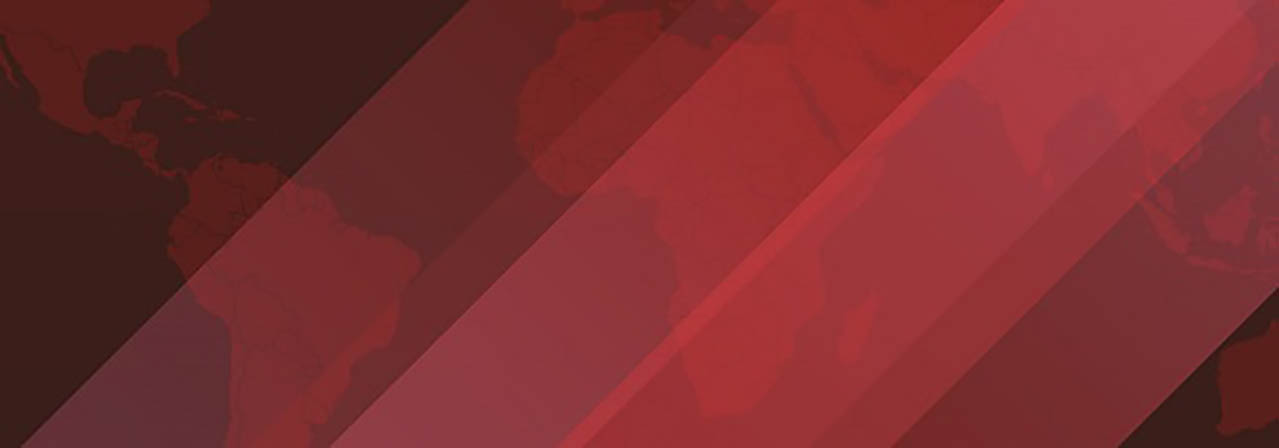

Global Emergency Update April 2024
Global Emergency Update
This is the latest report on Catholic Relief Services’ ongoing emergency response and recovery activities around the world. Our work is possible thanks to the generous support of private and public donors, the dedication of local partners, and the unwavering presence of Caritas and the local Catholic Church.Spotlight
Local Solutions to the Global Food Crisis
Across the world, a reported 258 million people are facing food insecurity—in some cases, starvation, destitution, extremely critical levels of acute malnutrition and death. East Africa and the Sahel are areas of urgent concern. In a global response, Catholic Relief Services is investing in local solutions to help break this cycle—by working with and supporting existing local systems. This is because local organizations are often the first to respond to crises, and are sometimes the only ones with access to people in need. Likewise, local government, when safe and functioning, is the first mandated line of social protection for food, health care, communal infrastructure, water services and more. However, many local responders might not have the experience, funding or capacity to fulfill the need.
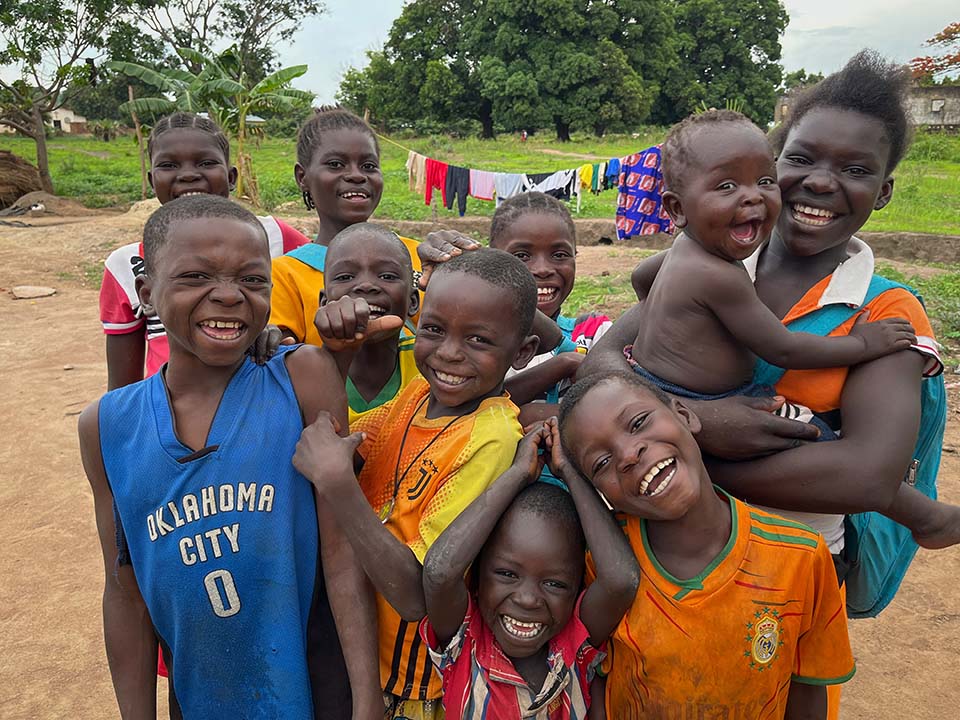
This family in the Central African Republic has benefitted from a CRS project that provides vulnerable households with dignified shelter and emergency food support.
Photo by Jennifer Lazuta/CRS
CRS is working with hundreds of local partners worldwide on programs that combine immediate, lifesaving support—including food distributions, nutritional supplements, clean water provision and health services. Longer-term initiatives seek to address the underlying causes of food insecurity by supporting communities and farmers with agricultural approaches that restore degraded lands, promote resilient seeds and agriculture practices that withstand droughts and other climate disasters, and bolster sustainable livelihoods. CRS programs engage local vendors, suppliers and markets to help ensure the local economy can survive and recover. Strained local supply chains disrupt the availability of food, causing prices to skyrocket. Assistance that engages and strengthens local supply chains helps keep food affordable and accessible in communities that are at greatest risk for hunger and starvation. Our work to strengthen local leadership and institutions upholds our commitment to subsidiarity, the belief that communities closest to local challenges are the best agents of their own development.
“Local leaders understand the context and the reality of the situation. We work closely with local Caritas as well as local civil society organizations and NGOs, so that we can reach the last mile. We want to promote system changes, to improve adaptation to changing conditions, and reduce people’s risk to coping mechanisms.”
In the News
The Holy Land
It has been six months since a humanitarian crisis across the Holy Land escalated with a total siege on Gaza following an unprecedented attack on Israel. Since the start of these tragic events, Gaza has become one of the world’s most dangerous places for civilians. An estimated 90% of the population—2 million people—are facing acute food insecurity, the largest ever recorded globally. Approximately 85% of the population has been displaced, with many living on the street or in overcrowded shelters. Lack of food, basic survival items, and lack of basic sanitation exacerbate the dire living conditions. More than 80% of residential housing infrastructure has been damaged or destroyed, along with infrastructure like hospitals, health centers, and water, electricity and telecommunications services. Severe access constraints continue to pose a major challenge for the delivery of lifesaving aid—especially in northern Gaza, which has been isolated from assistance for months.
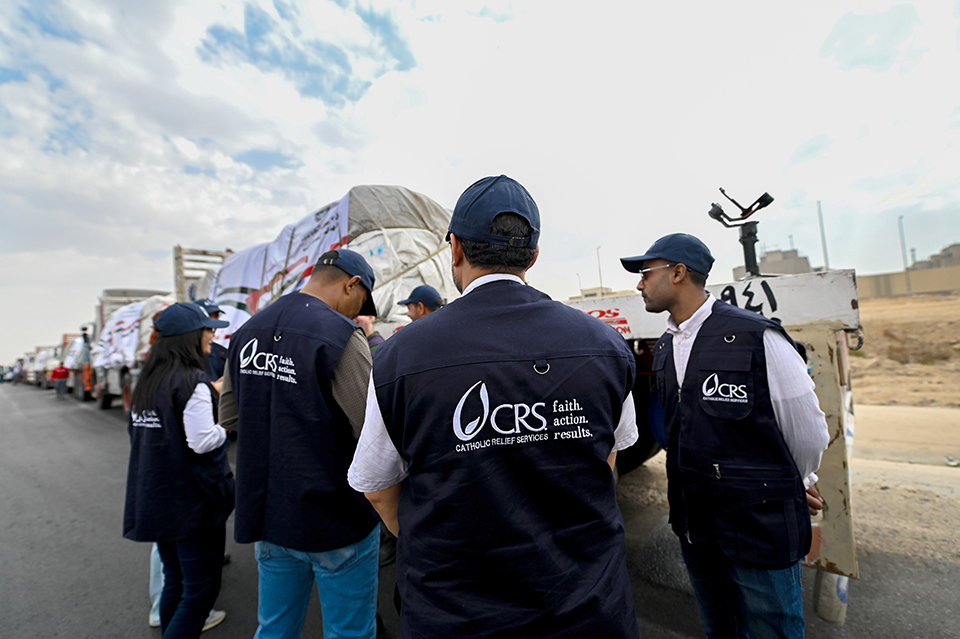
In Egypt, CRS coordinates the procurement and shipment of emergency supplies for Gazan families enduring unbearable deprivation during this crisis in the Holy Land.
Photo by Sayed Hassan for CRS
With a long-standing presence and seasoned staff and partners in Gaza and the region, CRS has been able to respond quickly and comprehensively, even in the extremely challenging operating context. To date, CRS has assisted more than 750,00 people in Gaza, as well as thousands of others across the region.
CRS’ Jerusalem, West Bank and Gaza country program is made up of 83 seasoned staff—including 44 in Gaza. CRS has opened two new offices and warehouses in Gaza in recent months and continues to collaborate with a range of partners and organizations.
Regionally, Egypt and Jordan are primary hubs for logistics, and Lebanon is an area of growing emergency response. The southern border of Lebanon has experienced ongoing cross-border armed confrontations in recent months, which has led to the displacement of 91,316 people. CRS has supported Caritas Lebanon with protective gear, fuel and medical supplies, as well as resources for cash assistance, health care, hygiene supplies and food aid for displaced families
“From the war’s unsettling beginning, our efforts have been a constant attempt to navigate the evolving circumstances, with a strong emphasis on providing not just shelter and food, but a lifeline to those in desperate need.”
Haiti
Protests and gang activity have escalated in and around Port-au-Prince, blocking roads, increasing insecurity, restricting travel and leading to the resignation of the Haitian prime minister in March 2024. According to the United Nations, 2.7 million people in Haiti are living in areas controlled or under the influence of armed groups and 96% of internal displacement is due to violence. At least 362,000 people have been displaced, of whom 89,000 are seeking refuge at sites across Port-au-Prince metropolitan area.
Families across Haiti have been weathering a growing humanitarian crisis, with at least 5 million people facing food insecurity. The Transitional Presidential Council was established by published decree on April 12, 2024, and its members have been named. In Port-au-Prince and surrounding areas, CRS is providing cash assistance to displaced families to help them relocate to safer areas, and improving water, sanitation, and hygiene services. In areas outside the capital, CRS and partners are providing food, shelter and water services; agriculture activities to improve the production of essential crops; voucher and cash assistance; support for caregivers and children; entrepreneur trainings; farmer learning groups; and ongoing recovery efforts following the 2021 earthquake.
Central American Migrant Crisis
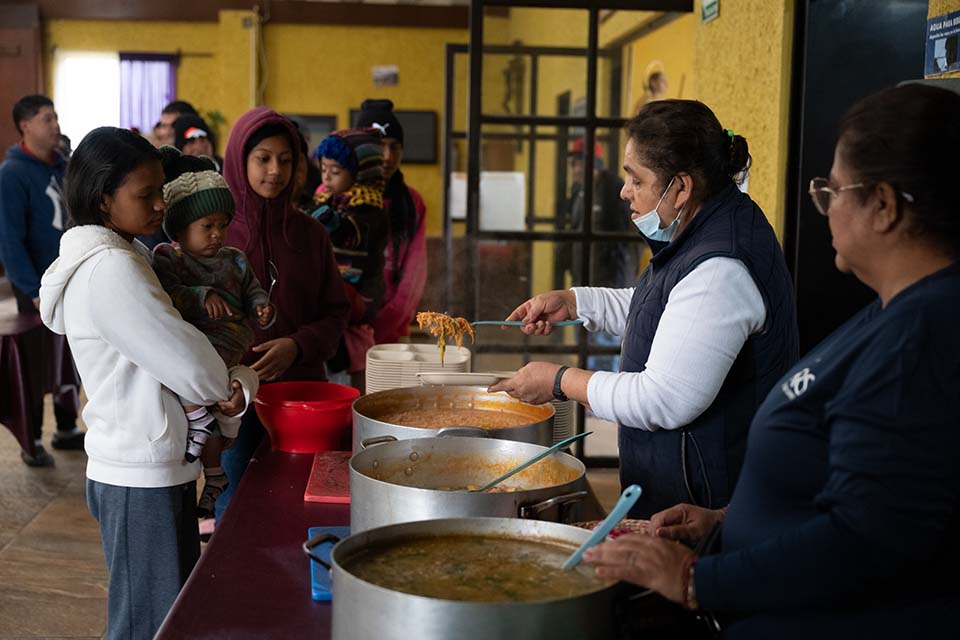
Migrants are served breakfast by volunteers at the San Juan Diego Migrant Shelter, located on the outskirts of Huehuetoca, Mexico. The shelter serves as an oasis where migrants rest, regain strength, and experience the warmth provided by those with goodwill, making their journey less complicated.
Photo by Thor Morales/CRS
In Honduras, Guatemala and El Salvador, escalating gang violence and drug cartels have caused families to flee north in increasing numbers. Economic collapse in places like Venezuela and Haiti is also driving large numbers of people to flee desperate conditions in their home countries. Many live in constant fear and struggle with chronic poverty, lack of job opportunities, and failed harvests caused by environmental degradation and climate change.
Thousands of people—including entire families—have arrived in Mexico seeking humanitarian visas, shelter, asylum or transit permits to reach the U.S. border. At the same time, Mexicans are displaced and migrating north to escape organized crime. More than 120 shelters and organizations are managed by Catholic institutions and civil society organizations across the region that provide food, a safe place to sleep for a few nights, medical assistance, legal advice, counseling and referrals to other organizations as needed for additional services. These shelters have been doubling or tripling their capacity and providing more services than usual—particularly for mental health, employment, legal representation and education. CRS is working closely with our Catholic partners and civic organizations to improve the safety, quality and efficiency of shelters and strengthen the capacity of staff and institutions at the front lines of the migrant crisis. This includes assistance for food, medicine and supplies; legal, medical and psychological counseling; upgraded facilities; and strengthening the capacity of shelter staff.
Madagascar
On March 27, 2024, Cyclone Gamane made landfall in Madagascar’s north and northeast regions, bringing heavy rains and floods to the regions of Analanjirofo, Diana, Atsinanana and Sava. Bridges collapsed, roads washed away and 3,700 acres of rice fields were flooded. An estimated 21,000 people are displaced, with 14,000 homes flooded and another 600 destroyed. Nearly 50 schools were also damaged or destroyed. CRS has extensive experience providing emergency response in other areas of the country affected by cyclones. With local partners, CRS is reaching the most affected communities, which are predominantly in rural areas, with shelter and hygiene kits for 1,000 families, and kits including a flashlight, underwear, menstrual pads and sarongs for 1,300 girls and women
With local partners, CRS is reaching the most affected communities, which are predominantly in rural areas.
Silent Emergencies
Côte D’Ivoire
Early in March 2024, residents in Côte D’Ivoire’s Attécoubé and Yopougon communes experienced abrupt demolitions without warning as local authorities bulldozed homes in low-income areas. More than 324,671 people were thrust into terrible circumstances as their homes, schools and livelihoods were demolished, leaving them in a state of extreme vulnerability. Those who are especially vulnerable—including children, pregnant or breastfeeding women, older adults, and people living with disabilities—were compelled to seek refuge in churches, youth centers or with host families. CRS’ Caritas partners identified more than 47,709 people who are homeless, living with their families in unsanitary and risky conditions. CRS is supporting partners as they provide food assistance, safe water, living and shelter supplies, school kits and mosquito nets.
Yemen
A humanitarian crisis has devastated the lives of families across Yemen as the civil war, which started in 2014, continues. With insecurity, economic decline, and disruption of public services severely limiting people’s access to food or income, 67% of the population is in urgent need of aid. Families struggle to find employment, especially young people who have an over 25% unemployment rate. Health systems have collapsed, along with access to clean water and sanitation, and more than 8 million children need support to access education.
CRS has been working closely with local partners in Yemen since 2018 to help families to access vital services and rebuild their lives and communities. In 2022, CRS established an in-country office to scale our support for partners and communities in need. CRS is currently working with partners to support youth livelihoods, restore safe and quality learning environments, and strengthen health systems in vulnerable communities.
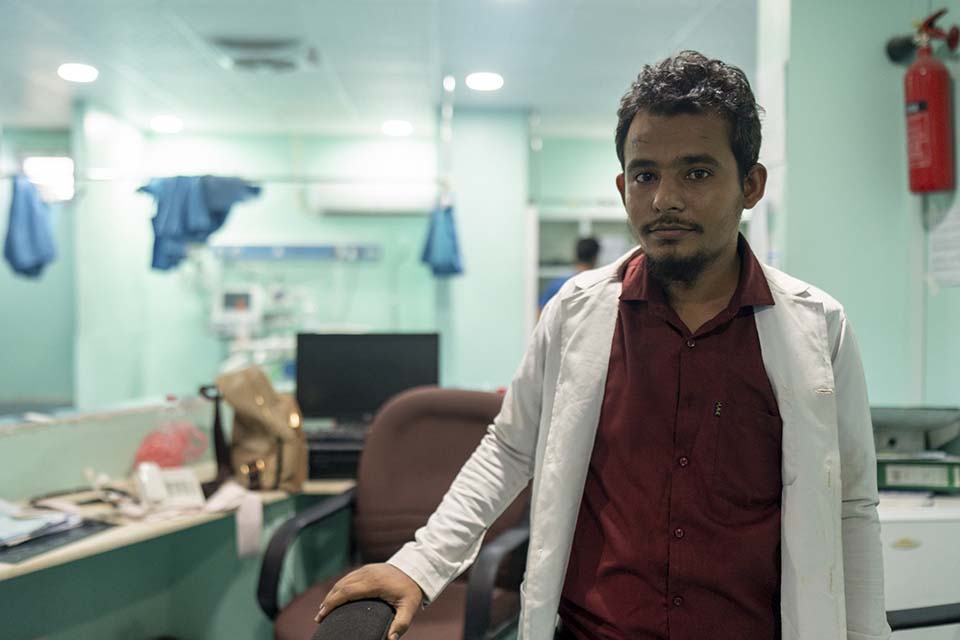
In Yemen, Ahmed Hassan Ali works in several hospitals in as a technician. Ahmed participated in a CRS supported job training project for young people that included English, computer classes, health education and first aid.
Photo by Ali Najip Mohamed Ebrahim for CRS
CRS, in collaboration with our partners, is providing support in the following areas:
Training and Jobs for Young People: We support young women and men to secure jobs in the health care sector through a job training and placement project, which includes work readiness, academic skills, internships and employer linkages. The project also includes building the capacity of vocational training institutes to integrate labor market assessments, work-readiness training, employer linkages, and improved information management in their programs.
Safe and Nurturing Learning Environments: We work at the family, community, school and government level to promote educational access and quality, with a current focus on two high-need public schools in Aden governorate. CRS also collaborates with the Ministry of Education to rebuild the early childhood education system in Yemen while an upcoming project aims to improve educational quality in all public early childhood education schools in Aden governorate.
Strengthening Health, Water and Sanitation Systems: We provide lifesaving health and water, sanitation and hygiene support to vulnerable communities by supporting the continued operations of three health facilities and community health worker teams in Aden.
Afghanistan
Afghanistan is managing a crisis after the Pakistan government announced in October 2023 that it will deport people without documentation, including an estimated 1.7 million undocumented Afghan migrants. More than 500,000 people returned to Afghanistan in late 2023, putting pressure on the country’s overly strained systems. Humanitarian needs at border points remain significant, including food, water, shelter, education, medical supplies and services. Longer-term resettlement and reintegration support for both returnees and host communities are critical.
The significant influx of people returning to Afghanistan has implications for both immediate and longer-term needs. Most urgently, they require food, counseling support and livelihoods recovery. Many returnees have no access to land or resources to support their livelihoods but have the capacities and skills for work if provided with adequate opportunities and entrepreneurship support. As the returned families settle in local communities, they are encountering the impacts of the years of drought and strained resources. Families who depend on agriculture for their livelihoods—which includes most families in Afghanistan—struggle to meet their food needs and generate income.
Humanitarian needs at border points remain significant, including food, water, shelter, education, medical supplies and services.
CRS is supporting returnees and host communities with food assistance support; access to safe water and hygiene and sanitation; and livelihoods recovery and development. We are integrating psychological first aid in our efforts, given the difficult journey and trauma many families are facing, and ensuring they have a decisive role and voice in their assistance, recovery and development. At the same time, CRS continues our recovery efforts following a series of earthquakes in October. CRS is providing a range of assistance, including cash assistance, agriculture and livelihoods support, water and sanitation, winter and shelter supplies.
Sudan
On April 15, 2023, armed conflict erupted across Sudan, with fighting concentrated in the capital, Khartoum, and in cities across Darfur and Kordofan states. More than 7 million people have been forcibly displaced in the eight months since the Sudan conflict started, including more than 5.7 million displaced within Sudan and 1.4 million seeking refuge across the border in neighboring Egypt, Chad, South Sudan, Ethiopia, the Central African Republic and Libya. More than 14 million children in Sudan require lifesaving assistance, the highest recorded number in the country’s history. The conflict has taken a heavy toll on infrastructure and limited people’s access to water, health care and other goods and services. Many farmers have been unable to access their land, seeds and tools for cultivation. Concerns are high that this season’s harvests might fail.
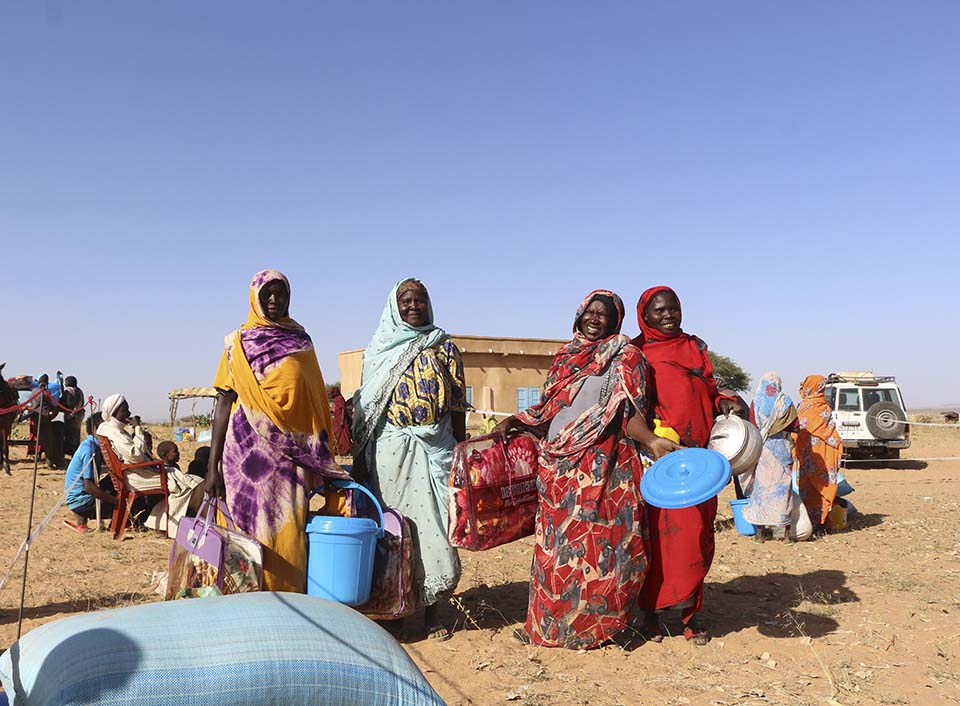
These four women were raising their families in West Darfur in Sudan when conflict there forced them to flee with their children, trekking for days to reach eastern Chad. They and 1,500 other families received food and essential living supplies as part of CRS’ emergency response to the situation.
Photo by Mabel Chenjoh/CRS
Despite significant operational challenges, CRS continues to provide critical humanitarian assistance to vulnerable communities across the greater Darfur region. From October through December 2023, CRS helped nearly 300,000 people with food, health care, nutrition, child protection, education, social cohesion, livelihoods, water, sanitation and hygiene. Additionally, and in collaboration with the World Food Program, CRS supported nearly 200,000 people in West and Central Darfur with the distribution of more than 2,000 tons of food. The rations included sorghum, vegetable oil, lentils and supplementary feeding supplies for malnourished children, covering one to two months of household food needs.
CRS is working with our partners to provide relief to Sudanese refugees in Egypt, Chad and South Sudan. Priorities include food; cash assistance; income generating activities; agricultural supplies and tools; shelter and living supplies; water, sanitation and hygiene; health and nutrition support; facilitation of social cohesion and peacebuilding activities; and emotional care and counseling support.
South Sudan
Over the past several months, an estimated 109,000 South Sudanese have returned from Gambella, Ethiopia, due to increasing insecurity there and limited humanitarian assistance. The Gambella region has been hosting nearly 400,000 South Sudanese refugees, primarily in camps. Humanitarian food assistance was suspended across Ethiopia in June 2023, including in these camps. Around the same time, a spike in violence perceived to be targeted along ethnic lines and particularly against refugees resulted in at least 100 deaths, destruction of shelters and villages, and disruption in humanitarian access. The deteriorating situation in the last half of 2023 drove refugee families to return to South Sudan. Families reported undertaking arduous and dangerous journeys and witnessing or experiencing violence on the way.
Most arriving returnees intend to return and permanently settle in their place of origin in Akobo County of Jonglei State. Some are also returning to Ulang, Nasir and Maiwut counties of Upper Nile state. These regions have received thousands of returnees fleeing the war in Sudan. Their most immediate needs are for cash assistance, food, shelter, living supplies and livelihoods support. With only limited humanitarian assistance, returning families are highly dependent on host communities, who are already highly vulnerable and food insecure. To date, CRS has reached 21,998 returnees with cash or livelihoods support.
West and Central Sahel
Sharply worsening conflict has caused mass displacement in the central Sahel region. This, coupled with a global food crisis, has created a humanitarian catastrophe in Mali, Burkina Faso and Niger. Almost 3 million people have fled violence. Although neighboring communities are sharing their limited resources, overcrowding increases pressure on livelihoods and overall well-being. The compounded events have resulted in heightened insecurity and a climate of volatile instability. CRS is supporting emergency efforts to meet lifesaving needs, build resilience and support social cohesion and peacebuilding.
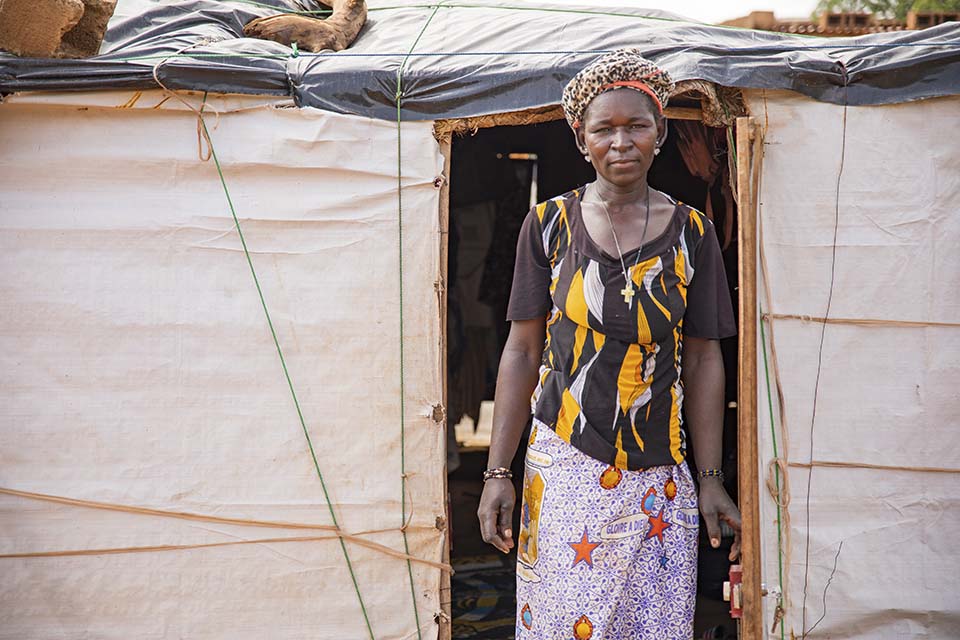
Haoua Sawadogo fled her village in Burkina Faso with her husband and six children after an attack by armed men.
Photo by Mountaga Drame for CRS
Priority areas for assistance include safe shelter; cash and supplies to meet basic needs for food and living; livelihoods support, including income generation and climate-smart agriculture; water, sanitation and hygiene; psychological first aid and counseling support; and capacity and leadership support for local organizations acting as first responders. In 2019, with the support of CRS, religious leaders launched the Sahel Peace Initiative to raise awareness about the importance of promoting peace in the region, advocate for change, and mobilize humanitarian and development actions.
Recovery and Resilience
Turkey and Syria: One Year After the Earthquake
In February 2023, a 7.8 magnitude earthquake and series of aftershocks struck Syria and Turkey, killing a reported 50,000 people. In Syria alone, 500,000 people were displaced from their homes, with minimal to no services. In Turkey, more than 2.7 million people were displaced, with as many as 800,000 homes and buildings damaged. The needs were critical for both urgent relief and support for long-term recovery.
Over the past year, CRS, with Caritas and our local partners in both countries, has helped meet the immediate needs of affected populations, including the provision of food assistance, household and hygiene supplies, emergency shelter materials as well as shelter repair, and counseling support.
Highlights
In Turkey, CRS partnered with Miyamoto International, a socially conscious engineering firm, to help families understand the safety of their buildings, and make light repairs. Through individual site visits and consultations with qualified engineers, families received the information, knowledge and support to make repairs to their homes and communities. Key achievements include:
- Assessment of 4,887 safe and undamaged units to confirm safety, supporting 18,570 people.
- Assessment and development of individualized repair plans for 11,544 lightly damaged units, to help families address their own repair needs, supporting 43,000 people.
- Sharing of guidance on the safety of undamaged or lightly damaged buildings, and cost-effective repair strategies—benefiting 400,000 people through community gatherings and social media campaigns.
In Syria, CRS supported Caritas and Church partners to provide families in collective shelters with assistance to meet urgent needs, including blankets, food, hygiene supplies, electricity and other support. With aid from CRS, partner activites included:
- The Salesians of Don Bosco in Aleppo, who hosted more than 350 people in their monastery, with bedding, meals, water, hygiene supplies, diapers and clothes.
- The Franciscans in Aleppo, who hosted 2,500 people in their monasteries and universities, with bedding, meals cooked by volunteers in the community, hygiene and living supplies.
- The Franciscans in Latakia, who hosted more than 200 people in their church, with bedding, meals cooked by community volunteers, hygiene and living supplies.
- Caritas Syria’s provision of 4,366 food baskets, 4,586 hygiene kits, 2,950 drinking water packages, 750 mattress, 736 blankets, and 1,400 diapers across 71 collective shelters hosting 9,685 people.
- The Sisters of the Holy Hearts of Jesus and Mary in Tartous, and Islamic Relief-USA, who provided monthly cash assistance to 409 families.
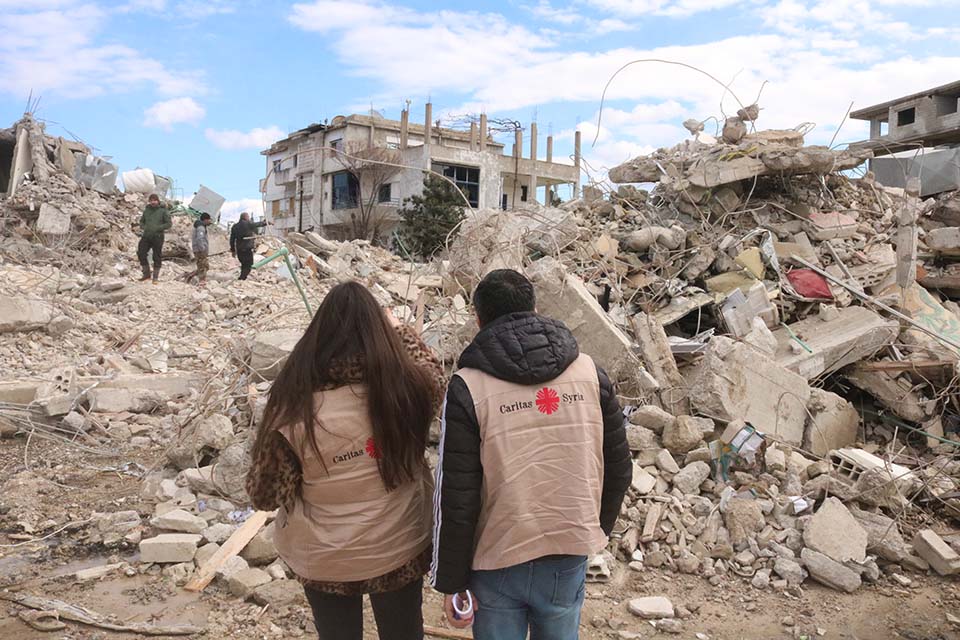
Caritas staff survey the destruction caused by the devastating 7.8 magnitude earthquake that struck northwest Syria and central Turkey on February 6, 2023.
Photo courtesy of Caritas Syria
Download & Print Global Emergency Update
English Global Emergency Update
Ukraine War: Two Years of Emergency Relief and Recovery—In February of 2022, Russia invaded Ukraine, causing massive destruction and loss, separating families and uprooting millions of people from their homes. Over the past two years, Catholic Relief Services has worked with Caritas and other partners across Ukraine and the region to provide a range of support to meet people’s urgent needs for food, shelter, living supplies, medical care and counseling. Emergency Response in the Holy Land—Catholic Relief Services and our partners are responding to immediate needs of families facing hunger and displacement in the Holy Land.
Recent Global Emergency Updates
February 2024
January 2024

